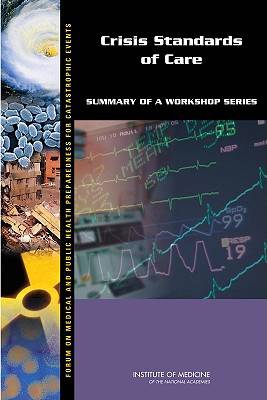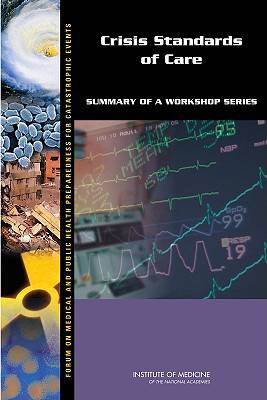
- Afhalen na 1 uur in een winkel met voorraad
- Gratis thuislevering in België vanaf € 30
- Ruim aanbod met 7 miljoen producten
- Afhalen na 1 uur in een winkel met voorraad
- Gratis thuislevering in België vanaf € 30
- Ruim aanbod met 7 miljoen producten
Crisis Standards of Care
Summary of a Workshop Series
Institute of Medicine, Board on Health Sciences Policy, Forum on Medical and Public Health Preparedness for CatastrophicOmschrijving
During a wide-reaching catastrophic public health emergency or disaster, existing surge capacity plans may not be sufficient to enable health care providers to continue to adhere to normal treatment procedures and follow usual standards of care. This is a particular concern for emergencies that may severely strain resources across a large geographic area, such as a pandemic influenza or the detonation of a nuclear device. Under these circumstances, it may be impossible to provide care according to the standards of care used in non-disaster situations, and, under the most extreme circumstances, it may not even be possible to provide basic life sustaining interventions to all patients who need them.
Although recent efforts to address these concerns have accomplished a tremendous amount in just a few years, a great deal remains to be done in even the most advanced plan. This workshop summary highlights the extensive work that is already occurring across the nation. Specifically, the book draws attention to existing federal, state, and local policies and protocols for crisis standards of care; discusses current barriers to increased provider and community engagement; relays examples of existing interstate collaborations; and presents workshop participants' ideas, comments, concerns, and potential solutions to some of the most difficult challenges.
Specificaties
Betrokkenen
- Auteur(s):
- Uitgeverij:
Inhoud
- Aantal bladzijden:
- 174
- Taal:
- Engels
Eigenschappen
- Productcode (EAN):
- 9780309126663
- Verschijningsdatum:
- 22/02/2010
- Uitvoering:
- Paperback
- Formaat:
- Trade paperback (VS)
- Afmetingen:
- 152 mm x 229 mm

Alleen bij Standaard Boekhandel
Beoordelingen
We publiceren alleen reviews die voldoen aan de voorwaarden voor reviews. Bekijk onze voorwaarden voor reviews.











